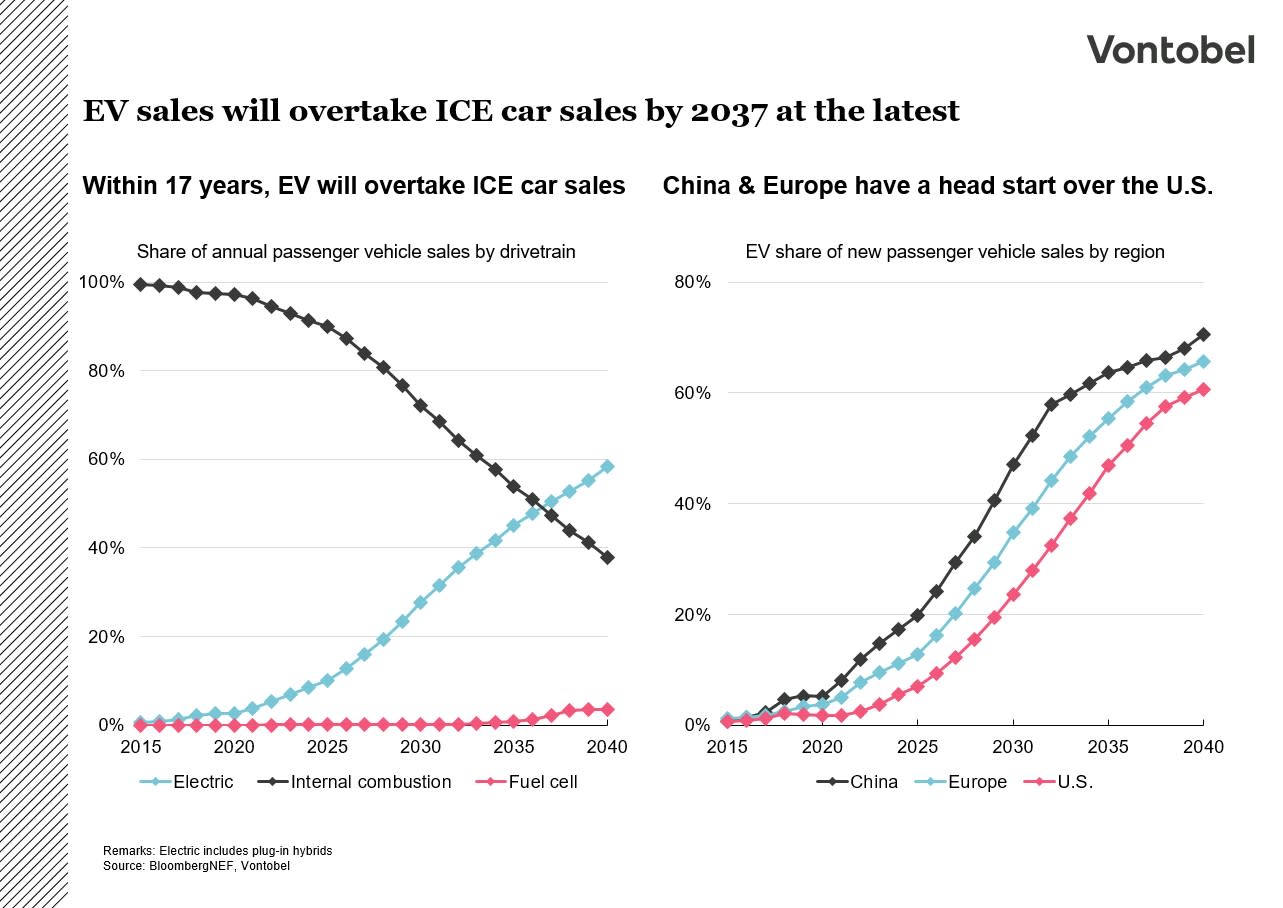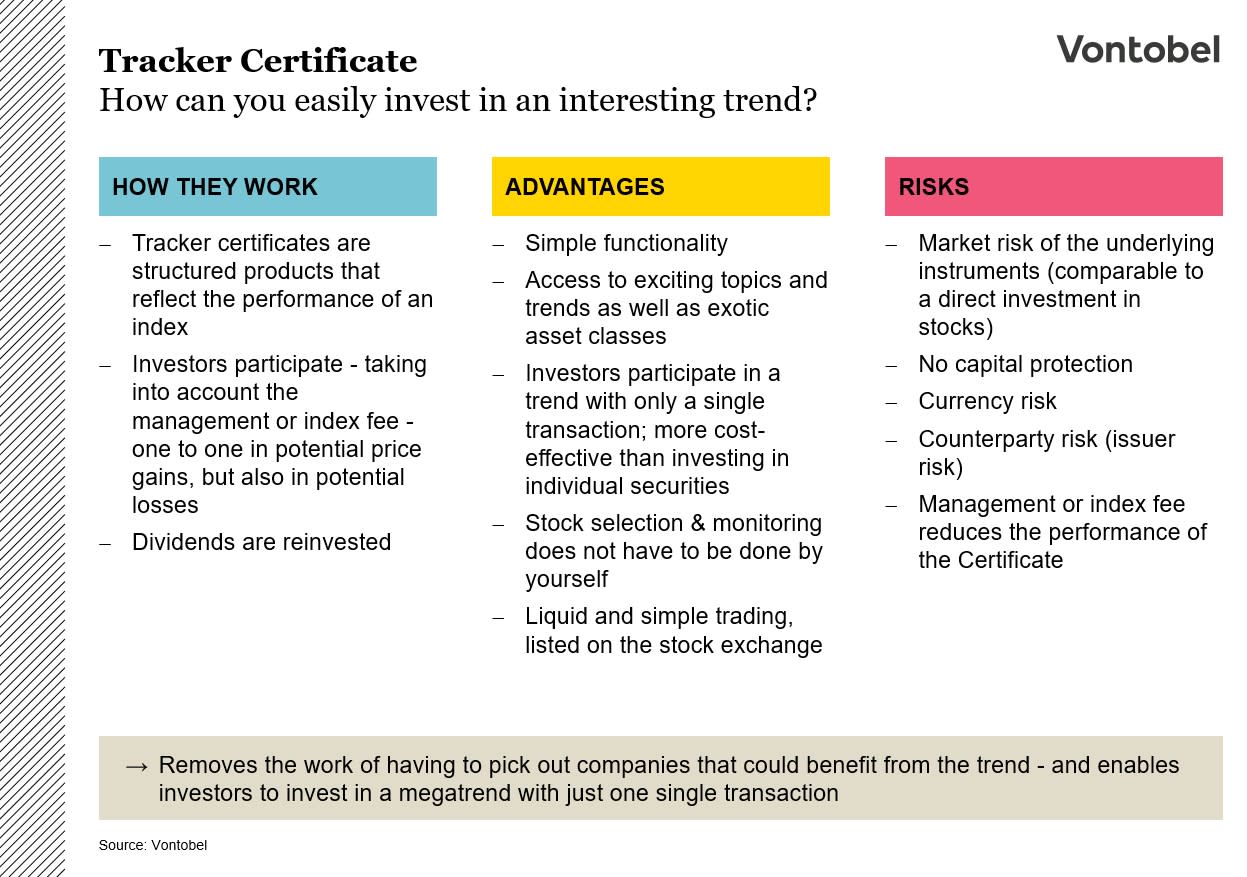Electric vehicle revolution

Electric vehicles (EVs) will soon be more powerful, cheaper and more environmentally friendly than current cars which run on fossil fuels. The new certificate on “Vontobel Electric Vehicle Basket” offers the opportunity to be a part of this exciting trend. You can read more about this in the following article.
Tesla share goes through the roof
Crises reinforce existing trends, this has been shown in the past year more than ever. It is therefore no surprise that Tesla was top of the list for shares performance in 2020. The share price of the electric vehicle pioneer rose an impressive 843 percent. Through this the company has a higher stock market value than its main competitors combined: Toyota, Renault-Nissan, General Motors, Hyundai-Kia, SAIC Motor, Honda and Fiat Chrysler. Tesla even manages to achieve this despite only producing thousands of cars a year whilst its competitors produce millions a year. The Chinese electric vehicle pioneer Nio showed a strong growth and the share price increased over 1000 percent over the course of the year.

The EV boom has already begun
It is well known that the share price is not based on the current earnings of a company, but primarily on future predicted and expected earnings. And indeed, it currently looks like the market share of electric cars will soon take off. According to the prognosis by Bloomberg NEF (BNEF) EV car makers will grow from having a 3 percent market share to a 20 percent market share by 2030. By 2037 the sales figures of electric cars will be higher than combustion powered cars.

These prognoses have not just been made up out of thin air. Sales targets for electric cars from several of the world’s leading automakers have recently been raised by over 20 percent for the year 2030. The change in the car industry is definitely not something that is going to stop. The reason for this is not just down to technological advances, but also due to increasing regulatory pressure from authorities. A model for many here is the example of Norway. Due to several tax incentives leading consumers to buy electric cars, the market share for new cars is already over 50 percent. Norway’s goal is to have a 100 percent quota by 2025. Other nations have also set similar zero-emission targets, Sweden in 2030, the United Kingdom for 2035, France for 2040 and Germany for 2050. At the same time the CO2 emissions barriers for vehicles in Europe is being constantly lowered, which can only be beneficial for EVs. Because the majority of CO2 emissions from e-vehicles come from the manufacturing stage, not from driving the cars themselves. Over their entire lifetime, EVs are more environmentally friendly than traditional petrol vehicles, according to most studies.

Cheaper batteries are the key to success
Despite the positive prospects for EVs, even in 2040 the streets are likely to still be dominated by cars which run on fossil fuels. According to figures from BNEF, in 20 years only close to a third of all cars on the road will be electric cars. The move to electrifying cars could however happen much faster. According to BNEF, the rise in CO2 emissions can only be slowed down at best, but cannot be reduced. Political pressure on the industry could therefore increase rather than decrease. On the other hand electric cars are becoming increasingly attractive for consumers compared to traditional combustion engines due to cost reasons. Variable costs are already significantly lower today. Due to tax benefits, every kilometer driven costs significantly less than with the classical combustion engine, even though fuel prices are currently very low. Additionally, maintenance costs are also significantly lower.

The initial purchasing price of electric vehicles could also soon become more competitive, even without government subsidies. Battery costs are an elementary factor here. A quick look into the price development in recent years suggests that the costs will continue to fall. The price of a battery pack has fallen from over 1000 USD per kilowatt hour (USD/kWh) in 2010 to 156 USD/kWh. This amounts to a yearly drop of almost 20 percent. According to estimates from the International Energy Agency, the pre-tax price of electric vehicles should become comparable to that of internal combustion engines within the next five years, even if the trend of falling battery costs slows.

How can investors be a part of this trend?
With this new certificate on the Vontobel Electric Vehicle Basket investors can participate in this fast developing market with only one product. The basket contains shares of companies which are involved with the production of electric vehicles, electric vehicle components, charging infrastructure, batteries and related materials. The exact title selection and weighting at initial fixing can be found in the factsheet. The investor bears the issuer risk.

Risks
This information is in the sole responsibility of the guest author and does not necessarily represent the opinion of Bank Vontobel Europe AG or any other company of the Vontobel Group. The further development of the index or a company as well as its share price depends on a large number of company-, group- and sector-specific as well as economic factors. When forming his investment decision, each investor must take into account the risk of price losses. Please note that investing in these products will not generate ongoing income.
The products are not capital protected, in the worst case a total loss of the invested capital is possible. In the event of insolvency of the issuer and the guarantor, the investor bears the risk of a total loss of his investment. In any case, investors should note that past performance and / or analysts' opinions are no adequate indicator of future performance. The performance of the underlyings depends on a variety of economic, entrepreneurial and political factors that should be taken into account in the formation of a market expectation.